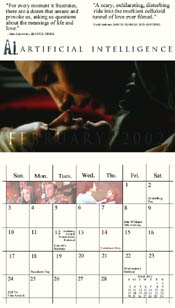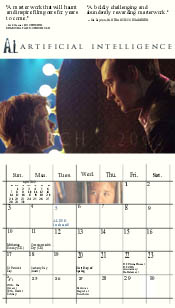|
- theresources
v2.2
-
- Contents
-
- Introduction to The
Resources
- Introduction
- Version
History and Credits
- Text Resources
- The
Screenplay v1.0
- Download
- Version
History
- "Supertoys
Last All Summer Long," by Brian Aldiss
- The
Text
- Commentary
- "The
Adventures of Pinocchio," by C. Collodi
- The
Text
- Commentary
- "The
Stolen Child," by W.B. Yeats
- The
Text
- Commentary
- Music Resources
- Gigolo
Joe's "I Only Have Eyes For You"
- Gigolo
Joe's "Cheek to Cheek"
- Mecha
Nanny's "Dodo, l'enfant, do" French lullaby
- "For
Always"
- Fan
Fiction
- "Once
A Perfect Day," by Henry Lake Spaulding
- "For
Yet Another Day," by Henry Lake Spaulding
- "Unto
All the Final Days," by Henry Lake Spaulding
- Desktop
Multimedia Files
- 'A.I.' Calendar New!
- Steven
Spielberg's Other Films
1.1 Document
Introduction
- welcome
- To aid you in your quest to understanding
this film (Or going more insane, whichever comes first), The Mysteries
of A.I. has provided several resources, ranging from a restored
screenplay for the film to lyrics of the Mecha Nanny's lullaby.
Enjoy.
1.2 Version History
and Credits
2.2 Updates
- Updated February 25th, 11:48AM
PST - 2002
- Written and copyright by Jedi
Kindergartner; Individual Material is copyright it's respective
owner.
- Added the month of March to the
A.I. Calendar! Please excuse the long wait!
2.1 Updates
- Updated January 5th, 12:27PM PST
- 2002
- Written and copyright by Jedi
Kindergartner; Individual Material is copyright it's respective
owner.
- Added the month of February to
the A.I. Calendar, as well as now offering both months in different
sizes.
2.0 Updates
- Updated December 21st, 4:27PM
PST
- Written and copyright by Jedi
Kindergartner; Individual Material is copyright it's respective
owner.
- Added the "Desktop Multimedia
Files" section, complete with a 'MasterCard' ad and the month
of January in an exclusive A.I. Calendar!
1.6 Updates
- Updated November 20th, 9:25PM
PST
- Written and copyright by Jedi
Kindergartner; Individual Material is copyright it's respective
owner.
- Finally added every last chapter
of "The Adventures of Pinocchio"! Enjoy!
- Fixed some typical stuff
1.4 Updates
- Updated September 18, 8:41PM PST
- Written and copyright by Jedi
Kindergartner; Individual Material is copyright it's respective
owner.
- Added a link to Clear
and Haunting Visions' Fan Fiction section.
- Fixed some general problems.
1.3 Updates
- Updated September 17, 8:11PM PST
- Written and copyright by Jedi
Kindergartner; Individual Material is copyright it's respective
owner.
- Added the third, and final, story
in the "Days" trilogy - "Unto All the Final Days."
- Added more chapters to Collodi's
"Pinocchio."
- Added a paraphrased and plain-English
version of "The Stolen Child."
1.0 Updates
- Updated September 2, 8:25PM PST
- Written and copyright by Jedi
Kindergartner; Individual Material is copyright it's respective
owner.
2.1 The Screenplay
- Through the dilligent work of
numerous people on the Internet - collectively known as the Barflies
of the Shangri la - a highly-accurate screenplay has been assembled.
While the Barflies can't create an exact replica of the actual
script, they have managed to get the dialogue perfect as well
as accurately describe what occurs in each scene. And, voila,
we present to you - The Screenplay.
-
- Given this, The Screenplay is
an invaluable tool for analyzing each scene -- And truly understanding
this film.
-
- The Dialogue, Courtesy of the
Barflies of the Shangri la
2.1.1 The Screenplay
- Download
- The Screenplay is currently unavailable,
but will be in the upcoming future.
-
- You may also view just the Dialogue
at the Barflies' main page.
2.1.2 The Screenplay
- Version History
- The current version of The Screenplay
out is, well, -1.0. We're not exactly done yet. (We're working
on it!) In the meantime, please feel free to visit The
Dialogue! The Dialogue is a word for word perfect
copy of the actual Dialogue from the film.
2.2 "Supertoys
Last All Summer Long," by Brian Aldiss
-
- It started a long time ago (in
a galaxy far, far away), back in 1969, when British author Brian
W. Aldiss published a short story in Harper's Bazaar,
entitled "Supertoys Last All Summer Long." It challenged
the whole public thought on machines and the idea of robots.
And it also managed to pique the interest of director Stanley
Kubrick. Kubrick acquired the rights to the story from Aldiss
in November of 1982, and had hopes to make it into a feature
film. Aldriss, however, was skeptical, noting, "while Arthur
[C. Clark]'s story looks outwards to the solar system, my story
looks inwards," referring to another of Kubrick's films,
which was based upon Clark's short story, "The Sentinel."
(Aldiss has written a very nice Foreword, entitled "Attempting
to Please," preceding his latest book, Supertoys Last
All Summer Long: And Other Short Stories of Future Time.
The Foreword encompasses the "joking" relationship
he and Kubrick had. The book also contains the two sequels to
the original story, as well as several other stories - All fairly
interesting, especially for science fiction readers.
-
- Another disagreement that arose
was that Kubrick had continually fashioned the story after "Pinnochio,"
which Aldiss strictly objected to - "I could not or would
not see the parallels between David, my five-year-old android,
and the wooden creature who becomes human. It emerged that Stanley
wished David to become more human, and wished, also, to have
the Blue Fairly materialise. Never consciously rewrite old fairy
stories, I say," Aldiss comments in his Foreword.
-
- Aldiss was quickly wheeled out
of the picture at about 1990. Kubrick took on "Supertoys
Last All Summer Long," rechristened it A.I.,
and continued to work on his little "Pinnochio"-esque
fairy tale, bringing in others, such as Sara Maitland and Ian
Watson. Aldiss went onto other things. Then, in 1999,
Stanley Kubrick passed away. During the past 9 years or so,
Kubrick had kept his friend Steven Spielberg very involved in
the film, the two of them faxing over 900 pages of notes back
and forth. When Kubrick passed away, his brother-in-law Jan
Harlan Kubrick decided to pass the film along to Spielberg,
whom Kubrick frequently had said would be the perfect director
for the film.
-
- And so it was. Steven Spielberg
started up on the film, scrapping the numerous other scripts
and treatments which Stanley Kubrick had gathered, and completely
rewriting the script solely by himself, his first screenwriting
job since Close Encounters of the Third Kind. It was
also during this time that it occurred to Brian Aldiss to re-read
his short story - It occurred to him that the story of a young
boy rejected by his mother could be continued. And so he wrote
the two follow-ups, "Supertoys When Winter Comes"
and "Supertoys in Other Seasons." After completion,
he passed both short stories onto Spielberg, who liked the ideas
presented in them and purchased the rights to the two stories
- Now, by an amicable arrangement with Warner Brothers, Spielberg
had acquired all three Supertoy stories.
2.2.1 "Supertoys
Last All Summer Long," by Brian Aldiss - The Text
- The full text of "Supertoys
Last All Summer Long" is available here. However, I strongly urge you to go out and buy
Aldiss' book, Supertoys Last all Summer Long: And Other Short
Stories of Future Time. Not only do you get the original
"Supertoys", you get it's two sequels and literally
tons of other short science fiction stories. And hey,
you also get a pretty cool forward. (Link to Amazon.com link will
be available shortly!)
-
- "Supertoys Last All Summer
Long," by Brian Aldiss
2.2.1 "Supertoys
Last All Summer Long," by Brian Aldiss - The Commentary
- Commentary coming shortly!
2.3 "The Adventures
of Pinocchio," by Carlo Collodi
- Description coming shortly! Bear
with us...
2.3.1 "The
Adventures of Pinocchio," by Carlo Collodi - The Text
- You may read the full text to
"The Adventures of Pinocchio", courtesy of the Gutenburg Project. I would strongly
recommend that you do, as it will aid you indefinitely in the
understanding of this film -- And, well, it's a cool story. :)
-
2.3.2 "The
Adventures of Pinocchio," by Carlo Collodi - Commentary
- Commentary coming soon! (I'm sure
you can wait...)
2.4 "The Stolen
Child," by W.B. Yeats
- "The Stolen Child,"
a poem by W.B. Yeats, can be found throughout A.I.
-- Dr. Know shows part of it to Gigolo Joe and David, Professor
Hobby has it on his office door, Dr. Frankenstein has his creation
recite it... (Er, maybe not that last one...)
-
- We now present you the full text
of this wonderful poem, as well as commentary on it's appropriateness
and history.
2.4.1 "The
Stolen Child," by W.B. Yeats - The Text
- Where dips the rocky highland
Of Sleuth Wood in the lake,
There lies a leafy island
Where flapping herons wake
The drowsy water-rats;
There we've hid our faery vats,
Full of berries
And of the reddest stolen cherries.
Come away, O human child!
To the waters and the wild
With a faery, hand in hand,
For the world''s more full of weeping than you can understand.
Where the wave of moonlight glosses
The dim grey sands with light,
Far off by furthest Rosses
We foot it all the night,
Weaving olden dances,
Mingling hands and mingling glances
Till the moon has taken flight;
To and fro we leap
And chase the frothy bubbles,
While the world is full of troubles
And is anxious in its sleep.
Come away, O human child!
To the waters and the wild
With a faery, hand in hand,
For the world''s more full of weeping than you can understand.
Where the wandering water gushes
From the hills above Glen-Car,
In pools among the rushes
That scarce could bathe a star,
We seek for slumbering trout
And whispering in their ears
Give them unquiet dreams;
Leaning softly out
From ferns that drop their tears
Over the young streams
Come away, O human child!
To the waters and the wild
With a faery, hand in hand,
For the world''s more full of weeping than you can understand.
Away with us he's going,
The solemn eyed:
He'll hear no more the lowing
Of the calves on the warm hillside
Or the kettle on the hob
Sing peace into his breast,
Or see the brown mice bob
Round and round the oatmeal-chest.
For he comes, the human child!
To the waters and the wild
With a faery, hand in hand,
From a world more full of weeping than he can understand.
- You can read more of Yeats' poems
at this website.
2.4.2 "The
Stolen Child," by W.B. Yeats - Commentary
- Simply reading it, "The Stolen
Child" seems a very suitable poem for this film indeed. However,
all the more suitable when you consider Yeats' life. Special thank
you to ktrevena, over at the DreamWorks
Fansite Talkbacks for writing this biography -
-
- The poem is W.B Yeats's
"The Stolen Child," one the the Nobel-prize winning
Irish poet's most famous, published in the 1889 collection
"Crossways." The fact that this poem is quoted in
"A.I." is remarkable for a number of reasons, not
the least of which, whether or not Steven Spielberg knew this
one or intuited it, is that Yeats forever felt unloved by
his mother, Susan Pollexfen Yeats, although it was his mother
and her family who set him on his life-long quest after "metaphor
for poetry," and from whom he inherited his poetic voice.
As his father, John Butler Yeats, a portrait painter of no
small regard said of his remarkable son: "By marriage
with a Pollexfen I have given a tongue to the seacliffs."
Yeats not only created Irish theatre--which has given us not
only his under-appreciated but incalculatibly influential
plays (see Samuel Beckett: "Waiting for Godot,",
etc., and trace its genesis, for example), he single-handedly
lit the still-flaming torch of the Irish Renaissance, which
has burned steadily since his own "Wind Among the Reeds",
the plays of Synge, the Easter Rising, James Joyce, Sean O'Casey,
Joyce Carey, Sinead O'Connor, U2, the Cranberries, and the
films of James Sheridan.
-
- DeeKelly, also
a member of the DreamWorks Fansite Talkbacks, expounds on the
poem -
-
- The inclusion of Poem
on the Door, having been paraphrased from the Yeats poem "The
Stolen Child", brings with it some especially strong
symbolism when juxtaposed with the themes present in many
Fairy Myths.
Consider this:
A woman who lived near Breage Church [Isle of Man] had a fine
girl baby, and she thought the piskies came and took it and
put a withered child in its place. The withered child lived
to be twenty years old, and was no larger when it died than
when the piskies brought it. It was fretful and peevish and
frightfully shriveled. The parents believed that the piskies
often used to come and look over a certain wall by the house
to see the child. And I heard my grandmother say that the
family once put the child out of doors at night to see if
the piskies would take it back again.
(OR)
Those who believe in the darker side of fairies believe that
they abducted humans and are given to or sacrificed to the
devil or used to strengthen fairy stock. Others believe that
the captive humans were merely fancied by the fairies and
taken for their company (being treated quite well, but never
being allowed to return to their human domain). In many such
cases, a log of wood would be left in the place of the abducted
human -- with a bewitching spell upon it that left all around
it believing it was indeed the original person, laying still,
sick and dying.
-
- No mere coincidence that Spielberg
included this in A.I., indeed. Yet another dark
theme that 'A.I.' seems to explore. This is not just some half-witted,
"B"-rated film. This is a carefully thought out masterpiece,
and I commend Spielberg and Kubrick for it.
-
- Finally I am pleased to announce
that "Super Teddy," of the DreamWorks Fansite TalkBacks as well, wrote this wonderful
paraphrased and condensed version of "The Stolen Child,"
to further add comprehension to the poem, and to the film itself.
-
- In the highlands, there
is an island in the middle of a lake. It is a beautiful island,
covered with bright vegetation; where the heron wake the sleeping
rats on the lake each morning. This hidden island is where
we, the fairy folk dwell. Ee steal the best cherries and the
brightest berries, and here we have hidden them in great pots.
Come with us, human child, to our magical island. let us take
you by the hand, for the world that you live in is filled
with so much sadness...
-
- At nightfall, we dance
merrily on the shore until dawn. The other world is sleeping,
dreaming troubled dreams; they are anxious and disturbed,
but not us! We leap happily on the shore, chasing the sea-foam
bubbles. High in the mountain streams, we play with the slumbering
trout that sleep in our magic pools. Fiendishly, we lean out
over the water, whispering to them; unsettling their dreams.
Come with us! We will take you to our magic island, and you
may frolic with us in the waters and in the wild lands we
dwell in!
-
- Our world is so full of
mystery, and happiness.... and yours is plagued with darkness,
and is more sad than you might ever know...
-
- There was once a human,
a solemn human child, who we took away from the human world
and brought to ours. No longer will he work the fields in
the morning, and hear the low mooing of the cow. No longer
will the sun warm his face. No longer will he be comforted
by the simple things he loves. But now, he will sing and laugh
all day with us. For we brought the human child home to the
fairy land. He came from a world more full of weeping than
we can understand.
That might help add further comprehension
to the poem. Given this, there are several possibilities that
might stem from this -
- One, this is an exact, only
opposite, parallel of the film. It talks of a human
child being led into the faery (aka Mecha) world.
- Two, this is an exact parallel
of the film. It talks of a mecha child being
led into the faery (aka Orga) world.
- We'll leave it to you to decide
between those two possibilities. Or there is also this final possibility
-
- The supermechas, at
the end, beckon David into their world. David's present reality
is much too harsh, so they bring him into their fantastical
world, where "dreams are born."
3.1 Music Resources
- Gigolo Joe's "I Only Have Eyes For You"
- One of the songs that Gigolo Joe
uses to seduce women is the romantic 1930s classic, "I Only
Have Eyes For You," which was first recorded in 1934 by Ben
Selvin, and has been re-recorded by everyone from Frank Sinatra
to Art Garfunkel, from The Flamingos to N'Sync. This version was
recorded by Dick Powell.
-
- "I Only Have
Eyes For You"
- By Al Dubin and Harry Warren
- Sung by Dick Powell
-
- My love must be a kind of
blind love.
I can't see anyone but you.
Are the stars out tonight?
I don't know if it's cloudy or bright.
I only have eyes for you, dear.
The moon may be high,
But I can't see a thing in the sky.
'Cause I only have eyes for you.
I don't know if we're in a garden
Or on a crowded avenue.
You are here, so am I.
Maybe millions of people go by.
But they all disappear from view.
And I only have eyes for you.
3.2 Music Resources
- Gigolo Joe's "Cheek to Cheek"
- "Cheek to Cheek" is
yet another romantic song that Joe churns out to seduce the ladies.
"Cheek to Cheek" originally appeared in the film Tom
Hat, and is written by Irving Berlin and sung by Fred
Astaire.
-
- "Cheek to Cheek"
- Music and Lyrics by Irving
Berlin
- Sung by Fred Astaire
-
- Heaven... I'm in heaven,
And my heart beats so that I can hardly speak.
And I seem to find the happiness I seek,
When we're out together dancing cheek to cheek.
Heaven... I'm in heaven,
And the cares that hung around me through the week,
Seem to vanish like a gambler's lucky streak,
When we're out together dancing cheek to cheek.
Oh, I love to climb a mountain,
And to reach the highest peak.
But it doesn't thrill me half as much
As dancing cheek to cheek.
Oh, I love to go out fishing
In a river or a creek.
But I don't enjoy it half as much
As dancing cheek to cheek.
Dance with me! I want my arms about you.
The charms about you
Will carry me through to...
Heaven... I'm in heaven,
And my heart beats so that I can hardly speak.
And I seem to find the happiness I seek,
When we're out together dancing cheek to cheek.
3.3 Music Resources
- Mecha Nanny's "Dodo, l'enfant, do" French lullaby
- In the midst of capture by Lord
Johnson-Johnson, David meets a Mecha Nanny who offers to take
care of him. Trying to calm him, she sings a French lullaby
called "Dodo, l'enfant, do" to him. While there are
several verses to the song, here is at least some of them -
-
- Dodo, l'enfant do,
L'enfant dormira bien vite
Dodo, l'enfant do,
L'enfant dormira bientôt...
-
- ...Une poule blanche
Est là dans la grange...
-
- ...Qui va faire un petit
coco
Pour l'enfant qui va faire dodo...
-
- Also, when translated from French
to English, this is roughly what you get...
-
- Sleep, sleep, child
sleep,
Child will fall asleep quickly;
Sleep, sleep, child sleep,
Child will soon be asleep.
3.4 Music Resources
- "For Always"
- John Williams, in addition to
composing and conducting the score for A.I.,
also recorded both a beautiful duet and a beautiful solo - set
to a track ("Monica's Theme") from his score - that
is performed by Lara Fabian and Josh Groban; and the solo, Lara
Fabian alone. The lyrics are by Cynthia Weil. "For Always"
can be found on the A.I. soundtrack, track #5
(for the solo) and track #13 (for the duet).
-
- "For Always"
- Music by John Williams
- Lyrics by Cynthia Weil
- Performed by Lara Fabian and
Josh Groban
-
- I close my eyes
And there in the shadows I see your light
You come to me out of my dreams
Across the night
You take my hand
Though you may be so many stars away
I know that our spirits and souls are one
We circled the moon and we've touched the sun
So here we'll stay
For always , forever
Beyond here and on to eternity
For always, forever
For us there's no time and no space
No barrier love won't erase
Wherever you go I still know in my heart you'll be here with
me
From this day on
I'm certain that I'll never be alone
I know what my heart must have always known
That love has a power that's all its own
And for always, forever
Now we can fly
And for always, and always
We will go on beyond goodbye
For always, forever beyond here and on to eternity
For always, and ever you'll be apart of me
And for always , for ever a thousand tomorrows may cross the
sky
And for always, and always, we will go on beyond, goodbye
4.0 Fan Fiction
- The Internet is exploding with
new fan fiction for this wonderful film, A.I.
While I would love to keep track of it all, thus far I have only
had a chance to read a few. (However if you wish for your fan
fiction to appear on this site, please don't hesitate to email me and chances are I will!) The three stories that
stand out above the rest I've read, are by far the "Day"
trilogy, by Henry Lake Spaulding -- "Once a Perfect Day,"
"For Yet Another Day," and "Unto All the Final
Days." Mr. Spaulding was gracious enough to let us host them
here.
- Along with these three pieces
of fan fiction, there are tons more out there, all very good as
well. Laurie, of Clear and Haunting Visions, has compiled quite
a big list of all of them, which you may find at her site.
-
4.1 Fan Fiction
- "Once A Perfect Day," by Henry Lake Spaulding
- The "Day" Trilogy, by
Henry Lake Spaulding, details Professor Hobby's life before the
events in the film occur, and his quest to make a mecha child...
The final story actually takes place during the events of the
film. Out of all the fan fiction I've read, I am simply astonished
at these three stories and how great they are! Extremely recommended!
It is suggested that you read them in order, starting off with...
-
- "Once A Perfect Day,"
by Henry Lake Spaulding
4.2 Fan Fiction
- "For Yet Another Day," by Henry Lake Spaulding
- The follow-up to "Once a
Perfect Day," it is highly recommended that you read that
first, before reading "For Yet Another Day." Still,
it's a wonderfully written story and, teamed with it's predecessor,
gives Professor Hobby new dimensions.
-
- "For Yet Another Day,"
by Henry Lake Spaulding
4.3 Fan Fiction
- "Unto All the Final Days," by Henry Lake Spaulding
- As of the week of September 10th,
2001, Henry Lake Spaulding wrote a third story in the "Day"
series. Of course it is recommended that you read the former two
first, before reading "Unto All the Final Days."
-
- "Unto All the Final Days,"
by Henry Lake Spaulding
5.0 Desktop Multimedia
Files
- We are delighted to offer an array
of different multimedia files, which -- in the foreseeable future
-- will include Desktop Themes, Wallpaper, Audio Files, and such.
All of the files are (and will be) designed by Jedi Kindergartner,
the webmaster of this site - The Mysteries of A.I. If you use these files for any
other use besides personal use, please be sure to give the Kindergartner
due credit and link back to this site. He greatly appreciates
it! Thank you!
5.1 Desktop Multimedia
Files - 'Mastercard' Advertisement
- Inspired by MasterCard's "There
Are Some Things Money Can't Buy, But For Everything Else, There's
MasterCard" advertisements, we present the following ad.
Please click on the thumbnail for a larger image.
-
-
5.2 Desktop Multimedia
Files - 'A.I.' Calendar
- While certainly not official,
we hope you will enjoy these 'A.I.' calendars, starting with the
month of January -- and we now have the month of February online,
as well! (And yes, the layout for this calendar was inspired by
the Oscar advertisements for 'A.I.'...)
-
- As requested, the calendar will
be offered in several different sizes. There is standard size,
540x950 (which should print nicely on most printers); 1080x1900
(which I have no idea how you're going to print out, unless you
have a professional publishing printer); and we have 1024x750
(restructured for wallpaper, though I don't know why
you'd want a calendar as wallpaper).
-
6.0 Steven Spielberg's
Other Films
- As you may well know, Ernest Rister
is a special commentator for this site. In addition to writing
regular portions on this film, he has written several in-depth
and fascinating articles at other Steven Spielberg films, as well
as other films. You can find all of his commentaries - which are
scattered throughout the site - in their completeness (Is that
even a word?) here.
-
- Spielberg, Kubrick, Disney's
PINOCCHIO, and A.I...
- EMPIRE OF THE SUN: Spielberg's Misunderstood Overlooked
Masterwork
- Defending Private Ryan:
A Look at SAVING PRIVATE RYAN
|
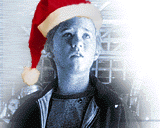

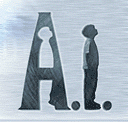


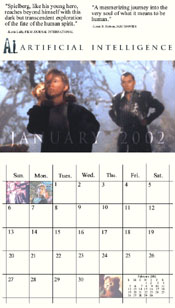 540x950
540x950